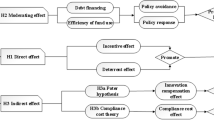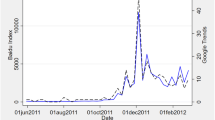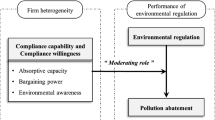Abstract
The question of how organisations choose their environmental strategy remains an unsolved problem in institutional theory. We argue that institutional pressure and the characteristics of the firm affect choices around environmental strategies. An empirical analysis of 597 heavily polluting firms indicates that more firms choose environmental leadership strategies, which means that they actively work with upstream and downstream firms to reduce emissions, when government pressure is the greatest; however, more companies are likely to choose pollution prevention strategies, which implies recycling materials in the production process is implemented, when public pressure is the greatest. Finally, organisations with more redundant resources and strong asset specificity are more prone to choose environmental leadership strategies as policy pressure or public pressure increases. The findings offer a decision-making framework to promote environmental measures related to government policy formulation and public participation. The results can also provide empirical evidence to guide environmental strategic choices for heavily polluting enterprises.

Similar content being viewed by others
Data availability
The datasets used in the study are available from the corresponding author upon request.
Notes
2018 China Ecological and Environmental Status Bulletin
In September 2010, the Ministry of Environmental Protection published the Guidelines on Environmental Information Disclosure of Listed Companies (draft for comments) that addressed the following 16 heavily polluting industries: thermal power, iron and steel, cement, aluminium, coal, metallurgy, chemicals, petrochemicals, building materials, papermaking, brewing, pharmaceuticals, fermentation, textiles, leather, and mining. All the enterprises in these 16 industries are classified as heavily polluting enterprises.
References
Barney J, Wright M, Ketchen DJ (2001) The resource-based view of the firm: ten years after 1991. J Manag 27(6):625–641. https://doi.org/10.1002/smj.4250160303
Baum ACJ, Oliver C (1992) Institutional embeddedness and the dynamics of organizational populations. Am Sociol Rev 57:540–559. https://doi.org/10.2307/2096100
Berrone P, Fosfuri A, Liliana G, Luis RG (2013) Necessity as the mother of ‘green’ inventions: institutional pressures and environmental innovations. Strateg Manag J 34(8):891–909. https://doi.org/10.1002/smj.2041
Bradley SW, Shepherd DA, Wiklund J (2011) The importance of slack for new organizations facing ‘tough’ environments. J Manag Stud 48(5):1071–1097. https://doi.org/10.1111/j.1467-6486.2009.00906.x
Buysse K, Verbeke A (2003) Proactive environmental strategies: a stakeholder management perspective. Strateg Manag J 24(5):453–470. https://doi.org/10.1002/smj.299
Carnes CM, Xu K, Sirmon DG, Karadag R (2019) How competitive action mediates the resource slack–performance relationship: a meta-analytic approach. J Manag Stud 56(1):57–90. https://doi.org/10.1111/joms.12391
Clarkson PM, Li Y, Richardson GD, Vasvari FP (2008) Revisiting the relation between environmental performance and environmental disclosure: an empirical analysis. Acc Organ Soc 33(4–5):303–327. https://doi.org/10.1016/j.aos.2007.05.003
Clemens B, Douglas TJ (2006) Does coercion drive firms to adopt ‘voluntary’ green initiatives? Relationships among coercion, superior firm resources, and voluntary green initiatives. J Bus Res 59(4):483–491. https://doi.org/10.1016/j.jbusres.2005.09.016
Dasgupta S, Wheeler D (1997) Citizen complaints as environmental indicators: evidence from China. The World Bank
Dimaggio PJ, Powell WW (1983) The iron cage revisited: institutional isomorphism and collective rationality in organizational fields. Am Sociol Rev 48:147–160. https://doi.org/10.2307/2095101
Fleming L, Bromiley P. 2003. A prospect theory model of R&D allocation and invention. Harvard Business School Working Paper Series
Freeman RE (2010) Strategic management: a stakeholder approach. Cambridge university press, Cambridge
Geiger SW, Makri M (2006) Exploration and exploitation innovation processes: the role of organizational slack in R & D intensive firms. J High Technol Manag Res 17(1):97–108. https://doi.org/10.1016/j.hitech.2006.05.007
Guo BS, He DW, Zhao XD (2020) Analysis on the spatiotemporal patterns and driving mechanisms of China’s agricultural production efficiency from 2000 to 2015. Phys Chem Earth, online. https://doi.org/10.1016/j.pce.2020.102909
Hao Y, Chen YF, Liao H, Wei YM (2020) China’s fiscal decentralization and environmental quality: theory and an empirical study. Environ Dev Econ 25(2):159–181. https://doi.org/10.1017/S1355770X19000263
Hart S L (1995) A natural-resource-based view of the firm[J]. Academy of Management Review 204:986–1014. https://doi.org/10.2307/258963
Hu J, Song XZ, Wang HJ (2017) Informal institution, hometown identity and corporate environmental governance. Manag World 3:76–94
Huang RB, Chen DP (2015) Does environmental information disclosure benefit waste discharge reduction? Evidence from China. J Bus Ethics 129(3):535–552. https://doi.org/10.1007/s10551-014-2173-0
Iyer DN, Miller KD (2008) Performance feedback, slack, and the timing of acquisitions. Acad Manag J 51(4):808–822. https://doi.org/10.5465/amr.2008.33666024
Jin G, Deng X, Zhao XD (2018) Spatiotemporal patterns in urbanization efficiency within the Yangtze River Economic Belt between 2005 and 2014. J Geogr Sci 28(8):1113–1126. https://doi.org/10.1007/s11442-018-1545-2
Kaplan S (2011) Research in cognition and strategy: reflections on two decades of progress and a look to the future. J Manag Stud 48(3):665–695. https://doi.org/10.1111/j.1467-6486.2010.00983.x
Kassinis G, Vafeas N (2006) Stakeholder pressures and environmental performance. Acad Manag J 49(1):145–159. https://doi.org/10.5465/amj.2006.20785799
Kassinis G, Vafeas N (2009) Environmental performance and plant closure. J Bus Res 62(4):484–494. https://doi.org/10.1016/j.jbusres.2008.01.037
King BG (2008) A political mediation model of corporate response to social movement activism. Adm Sci Q 53(3):395–421. https://doi.org/10.2189/asqu.53.3.395
Kuusela P, Keil T, Maula M (2017) Driven by aspirations, but in what direction? Performance shortfalls, slack resources, and resource-consuming vs. resource-freeing organizational change. Strateg Manag J 38(5):1101–1120. https://doi.org/10.1002/smj.2544
Lin HY (2012) Cross-sector alliances for corporate social responsibility partner heterogeneity moderates environmental strategy outcomes. J Bus Ethics 110(2):219–229. https://doi.org/10.1007/s10551-012-1423-2
Lounsbury M, Ventresca M, Hirsch PM (2003) Social movements, field frames and industry emergence: a cultural–political perspective on US recycling. Soc Econ Rev 1(1):71–104. https://doi.org/10.1093/soceco/1.1.71
Luo DL, Lai ZH (2016) Investment of heavily polluting enterprises and promotion of local officials–based on the practical investigation of data for prefectural cities during 1999-2010. Account Res 4:42–48
Marquis C, Jackson SE, Li Y (2015) Building sustainable organizations in China. Manag Organ Rev 11(3):427–440. https://doi.org/10.1017/mor.2015.37
Menguc B, Auh S, Ozanne L (2010) The interactive effect of internal and external factors on a proactive environmental strategy and its influence on a firm's performance. J Bus Ethics 94(2):279–298. https://doi.org/10.1007/s10551-009-0264-0
Meyer JW, Rowan B (1977) Institutionalized organizations: formal structure as myth and ceremony. Am J Sociol 83(2):340–363. https://doi.org/10.1086/226550
Oliver C (1991) Strategic responses to institutional processes. Acad Manag Rev 16(1):145–179. https://doi.org/10.5465/amr.1991.4279002
Pang FL, Zhuang GJ (2017) Commitment to asymmetric trading of proprietary assets and inter-firm trust. Ind Eng Manag 22(3):128–134
Pope HC, Draper CY, Nicholas WO, Paget C (2020) Use of decision cases for building SNAP-Ed implementers’ capacities to realize policy, systems, and environmental strategies. J Nutr Educ Behav 52(5):512–521. https://doi.org/10.1016/j.jneb.2019.09.020
Reid EM, Toffel MW (2009) Responding to public and private politics: corporate disclosure of climate change strategies. Strateg Manag J 30(11):1157–1178. https://doi.org/10.1002/smj.796
Sharfman MP, Wolf GC, Richard B, Tansik DA (1988) Antecedents of organizational slack. Acad Manag Rev 13(4):601–614. https://doi.org/10.5465/amr.1988.4307484
Vannoorenberghe G (2012) Firm-level volatility and exports. J Int Econ 86(1):57–67. https://doi.org/10.1016/j.jinteco.2011.08.013
Wang SB, Xu YZ (2015) Environmental regulation and haze pollution decoupling effect: based on the perspective of enterprise investment preferences. China Ind Econ 4:18–30
Wang HL, Zhao S, Chen GL (2017a) Firm-specific knowledge assets and employment arrangements: evidence from CEO compensation design and CEO dismissal. Strateg Manag J 38(9):1875–1894. https://doi.org/10.1002/smj.2604
Wang SY, Li J, Zhao DT (2017b) Institutional pressures and environmental management practices: the moderating effects of environmental commitment and resource availability. Bus Strateg Environ 27(1):52–69. https://doi.org/10.1002/bse.1983
Williamson OE (1984) The economics of governance: framework and implications. Zeitschrift für die gesamte Staatswissenschaft/J Inst Theor Econ H1:195–223
Williamson D, Lynch-Wood G, Ramsay J (2006) Drivers of environmental behaviour in manufacturing SMEs and the implications for CSR. J Bus Ethics 67(3):317–330. https://doi.org/10.1007/s10551-006-9187-1
Winter SC, May PJ (2001) Motivation for compliance with environmental regulations. J Policy Anal Manag: The Journal of the Association for Public Policy Analysis and Management 20(4):675–698. https://doi.org/10.1002/pam.1023
Wu HT, Hao Y, Ren (2020a) How do environmental regulation and environmental decentralization affect green total factor energy efficiency: evidence from China. Energy Econ, online. https://doi.org/10.1016/j.eneco.2020.104880
Wu HT, Li YW, Hao Y, Ren SY, Zhang PF (2020b) Environmental decentralization, local government competition, and regional green development: evidence from China. Sci Total Environ 708(15):1–15. https://doi.org/10.1016/j.scitotenv.2019.135085
Yang Y, Wei J, Luo LJ (2015) Who is using government subsidies to innovate? —joint adjustment effect of ownership and distortion of factor market. Manag World 1:75–86
Yang DF, Wang AX, Zhou KZ, Jiang W (2019) Environmental strategy, institutional force, and innovation capability: a managerial cognition perspective. J Bus Ethics 159(4):1147–1161. https://doi.org/10.1007/s10551-018-3830-5
Yang ZB, Shao S, Fan MT, Yan LL (2021) Wage distortion and green technological progress: a directed technological progress perspective. Ecol Econ, online. https://doi.org/10.1016/j.ecolecon.2020.106912
Yin JH, Wang S, Zhang LL (2019) Heterogeneous response of corporate environmental strategy under institutional isomorphism. J Beijing Inst Technol (Social Sciences Edition) 21(4):47–55
Zhao ZB, Yuan T, Shi XP, Zhao LD (2020) Heterogeneity in the relationship between carbon emission performance and urbanization: evidence from China. Mitig Adapt Strateg Glob Chang 25(7):1363–1380. https://doi.org/10.1007/s11027-020-09924-3
Funding
This study is supported by the National Natural Science Foundation of China (No. 72002013, No. 71874029), Project of Beijing Municipal Education Commission (No. SM202111417005), and Academic Research Projects of Beijing Union University (No. XP202010, No. SK40202101, No. JS10202005).
Author information
Authors and Affiliations
Contributions
Sen Wang and Jianhua Yin conceived the study and were responsible for the design and development of the data analysis. Xiaomei Zhu was responsible for data collection and analysis. All authors read and approved the final submitted manuscript.
Corresponding author
Ethics declarations
Ethics approval
Not applicable.
Consent to participate
Not applicable.
Consent for publication
Not applicable.
Competing interests
The authors declare no competing interests.
Additional information
Responsible Editor: Baojing Gu
Publisher’s note
Springer Nature remains neutral with regard to jurisdictional claims in published maps and institutional affiliations.
Rights and permissions
About this article
Cite this article
Wang, ., Yin, J. & Zhu, X. Heterogeneous choices of environmental strategies for heavily polluting firms under institutional pressure in China. Environ Sci Pollut Res 29, 7614–7626 (2022). https://doi.org/10.1007/s11356-021-16090-9
Received:
Accepted:
Published:
Issue Date:
DOI: https://doi.org/10.1007/s11356-021-16090-9




